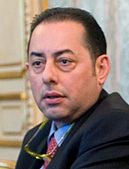2014 European Parliamentary Election
European Parliament election, 2014

|
| ← 2009
|
22 May 2014 (2014-05-22) - 25 May 2014 (2014-05-25) |
2019 → |
|
|
|
All 751 seats in the European Parliament
376 seats needed for a majority
|
| Turnout |
42.54% 0.7 pp 0.7 pp
|
| |
 |
 |
 |
| Leader |
Manfred Weber (from CSU) |
Gianni Pittella (from Democratic Party) |
Syed Kamall (from Conservative Party) |
| Alliance |
EPP |
S&D |
ECR |
| Leader's seat |
Germany |
Southern Italy |
London |
| Last election |
265 (36%) |
183 (25%) |
54 (7.3%) |
| Seats before |
274 |
183 |
57 |
| Seats won |
214 |
185 |
45 |
| Seats after |
221 (29.4%)
|
191 (25.4%) |
70 (9.3%) |
| Seat change |
 44 44 |
 8 8 |
 16 16 |
| Popular vote |
38,610,376 |
40,202,068 |
8,612,168 |
| Swing |
 6.6% 6.6% |
 0.4% 0.4% |
 2.0% 2.0% |
|
| |
 |
 |
 
|
| Leader |
Guy Verhofstadt (from Open Vld) |
Gabriele Zimmer (from the Linke) |
Philippe Lamberts (from Ecolo)
Rebecca Harms (from Greens) |
| Alliance |
ALDE |
GUE/NGL |
Greens–EFA |
| Leader's seat |
Belgium |
Germany |
Belgium
Germany
|
| Last election |
84 (11.4%) |
35 (4.8%) |
55 (7.5%) |
| Seats before |
83 |
35 |
58 |
| Seats won |
59 |
45 |
47 |
| Seats after |
67 (8.9%) |
52 (6.9%) |
50 (6.7%) |
| Seat change |
 16 16 |
 17 17 |
 5 5 |
| Popular vote |
11,652,405 |
9,243,548 |
12,058,475 |
| Swing |
 2.5% 2.5% |
 2.1% 2.1% |
 0.8% 0.8% |
|
| |
 
|
|
| Leader |
Nigel Farage (from UKIP)
& David Borrelli (from Five Stars) |
|
| Alliance |
EFDD |
|
| Leader's seat |
South East England
North-East Italy
|
|
| Last election |
32 (4.3%) |
|
| Seats before |
31 |
|
| Seats won |
38 |
|
| Seats after |
48 (6.4%) |
|
| Seat change |
 16 16 |
|
| Popular vote |
10,830,339 |
|
| Swing |
 2.1% 2.1% |
|
|

The largest European Parliament group as elected by each constituency.
For the French Overseas Territories constituency, its three sections are considered.
EPP S&D ALDE Greens/EFA
ECR GUE/NGL EFD
NI
|
|
EPP S&D ALDE Greens/EFA
ECR GUE/NGL EFD
José Manuel Barroso
Jean-Claude Juncker
From 22 to 25 May 2014, elections to the European Parliament were held in the European Union.
It was the 8th parliamentary election since the first direct elections in 1979, and the first in which the European political parties fielded candidates for president of the Commission. The candidates, sometimes referred to by the German term Spitzenkandidaten (‘top candidates’), were Jean-Claude Juncker for the European People's Party, Martin Schulz for the Party of European Socialists, Guy Verhofstadt for the Alliance of Liberals and Democrats for Europe, Ska Keller and José Bové jointly for the European Green Party and Alexis Tsipras for the Party of the European Left. The Alliance of European Conservatives and Reformists and the European Alliance for Freedom declined to nominate candidates.
...
Wikipedia










